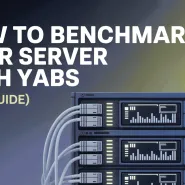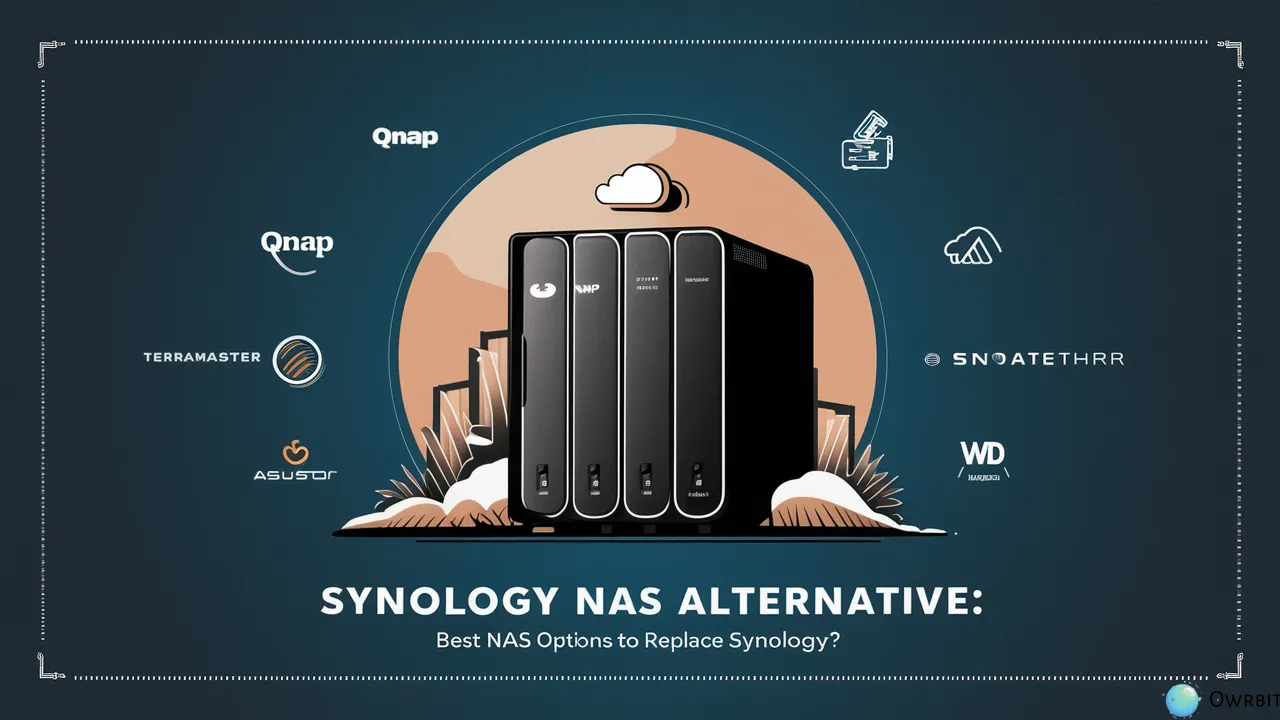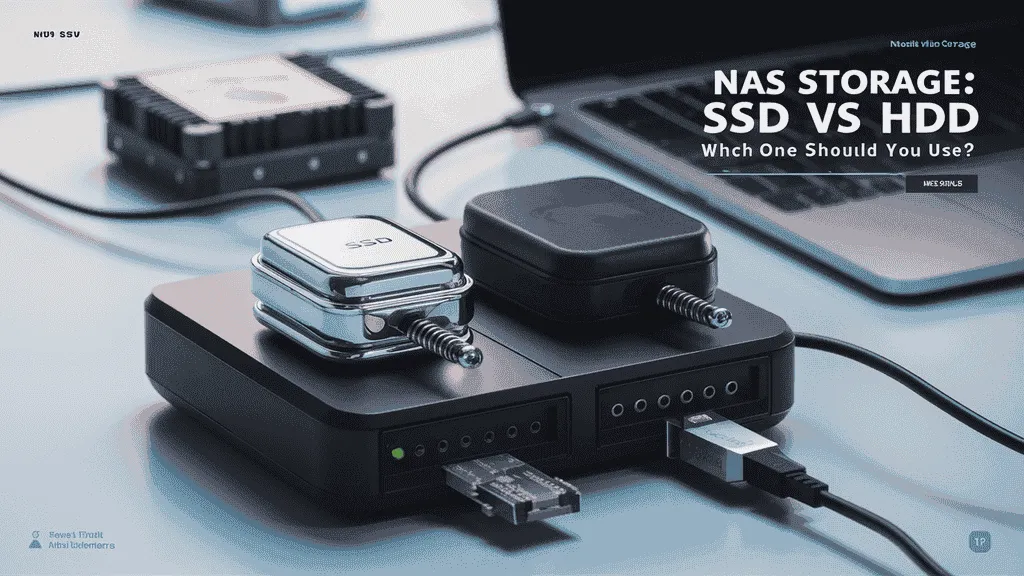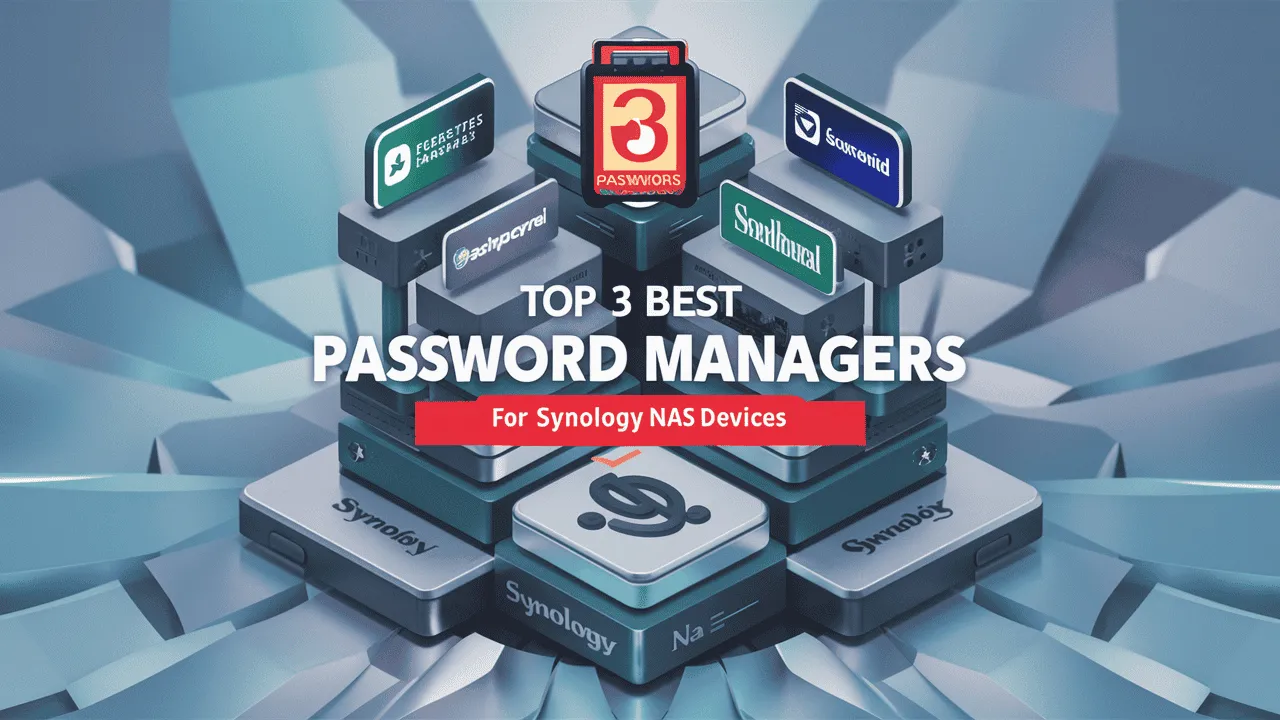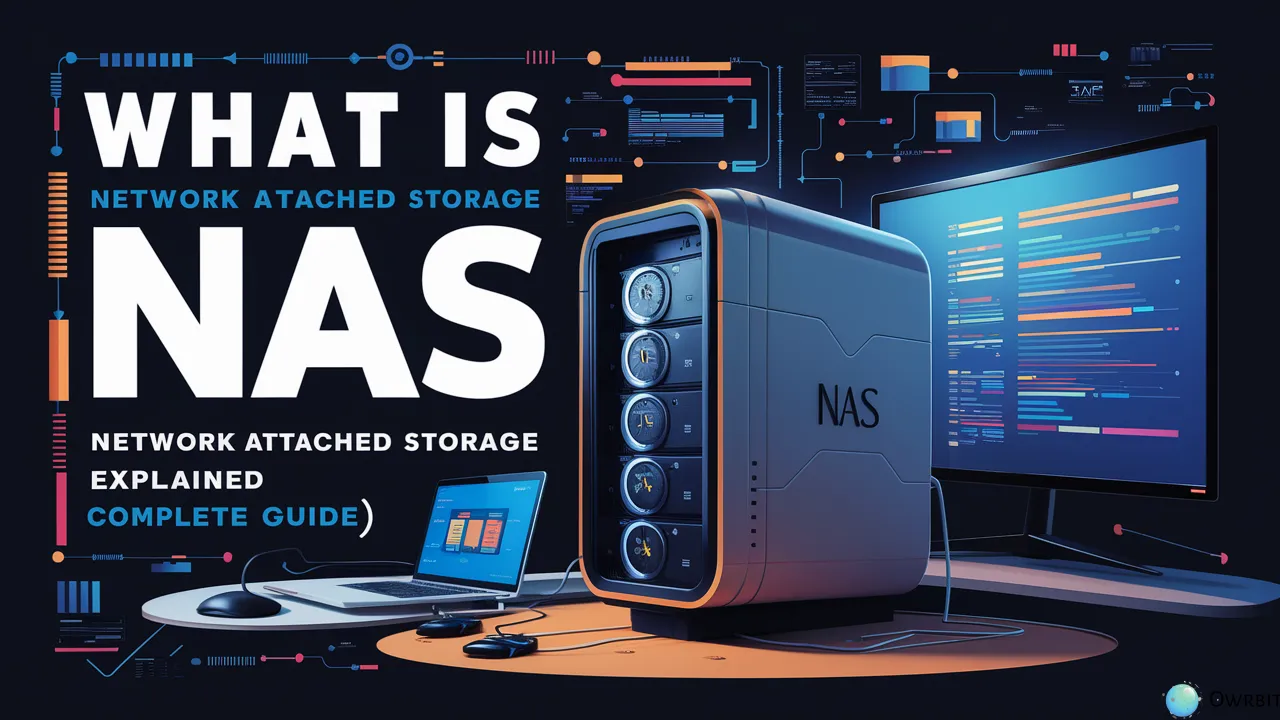Are you looking for a better way to store and manage your data? Synology NAS has been a popular choice for years, but in 2025, many people are looking for a Synology NAS alternative that better fits their needs. Whether you’re a small business owner who needs strong data protection or someone who wants a smooth media server at home, there are many new and powerful options out there that can replace Synology NAS.
In this easy-to-understand guide by Owrbit, we’ll walk you through the best Synology NAS Alternative you can find in 2025. These options offer great features, fast performance, and good value for your money. Some are very user-friendly, while others are packed with advanced tools for handling your data. No matter what you need, you’ll find a Synology NAS alternative that works for you.
We’ll look at important things like hardware specs, software features, how easy it is to grow your storage, and how much support you can get from the community. Plus, we’ll show you which options are best for certain jobs—like running backups, streaming media, or working with big files—so you can clearly see how they compare if you want to replace Synology NAS.
This guide is here to help you decide with confidence. Whether you’re trying to save money, want more features, or just feel like it’s time for a change, we’ve got you covered. Let’s explore the top Synology NAS Alternatives in 2025 and help you make the switch to something better.
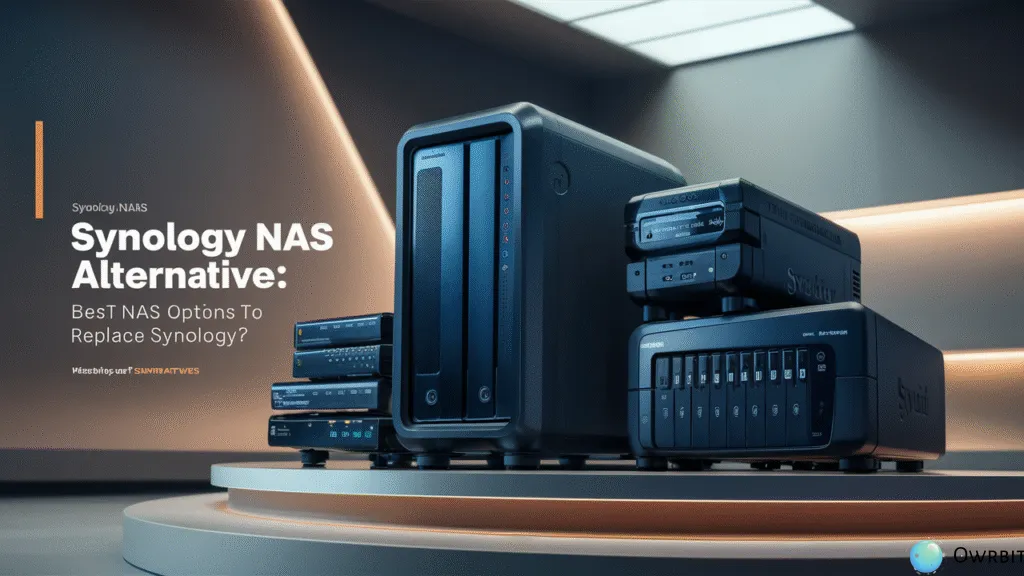
What is Network-Attached Storage (NAS)?
Network-Attached Storage (NAS) is a centralized storage platform that enables multiple users and devices to access and share data stored in storage over the network. This type of storage is typically equipped with their own operating system (NAS OS) and can also function as a dedicated NAS server. Different type of NAS servers provide different results, and it is essential to choose the best NAS for your specific needs.

Popular NAS vendors such as Synology, QNAP, Asustor. They all offer’s a wide range of NAS products mentioned in today’s market. When it comes to choosing the best home NAS, many users choose Synology NAS for its user-friendly interface and robust features. Others may opt for Qnap or Asustor depending on their specific requirements. Users can also buy budget NAS brands like D-Link if cost comes into play.
Whether you are a home user or a professional, selecting the right NAS system is crucial for seamless data management and accessibility.
Overview to Synology :
Synology Inc. is a Taiwanese company that specializes in designing the network-attached storage (NAS) devices. They are founded in the year 2000. Synology uses a rich operating system called DiskStation Manager (DSM), which provides a friendly interface for users and a range suite of applications for data management, backup, restore, storing, and multimedia purposes. Synology NAS devices can be used for personal, business or enterprise for storage solutions. They also offers features like protection of data through advanced security.

Benefits Of Synology NAS Devices :
Synology has built a strong reputation for its user-friendly interface, high performance, and extensive software ecosystem. Here are some of the key benefits of Synology:
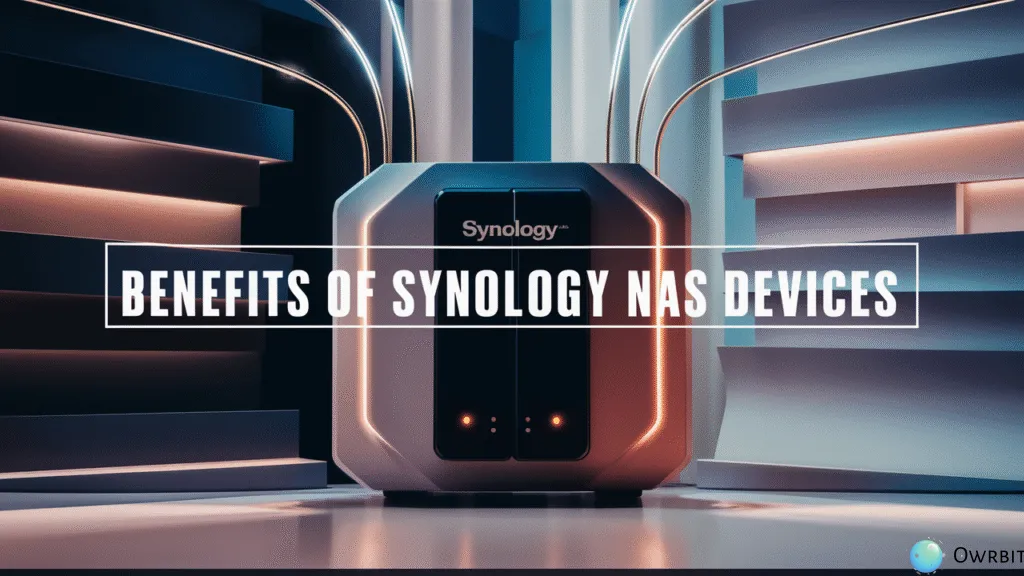
- User-Friendly Interface : Synology’s uses DiskStation Manager (DSM) that is one of the most intuitive and easy-to-use NAS operating systems on the market. DSM offers a smooth user experience, even for those who are not used any NAS device earlier.
- Software Ecosystem : DSM comes with a rich range of applications, including Synology Drive, Synology Moments, and Synology Office, which transforms the NAS device into a multi-functional device for file management, photo organization, and office productivity.
- Data Protection : Synology offers advanced data protection features such as RAID configurations, snapshot technology, and backup solutions. The Hyper Backup tool allows for multi-version backups to various destinations, including public clouds.
- Security Feature : With features like 2-factor authentication, firewall, and antivirus, Synology ensures that your data is well-protected against unauthorized access and cyber threats.
- Scalability : Synology NAS devices are designed to grow according to your needs. Many models support expansion units, allowing you to increase your storage capacity without replacing your existing device.
Why Consider Synology NAS Alternatives?
There are several reasons why users might want to switch to a Synology NAS alternative in 2025. Here’s a quick look at the most common ones:
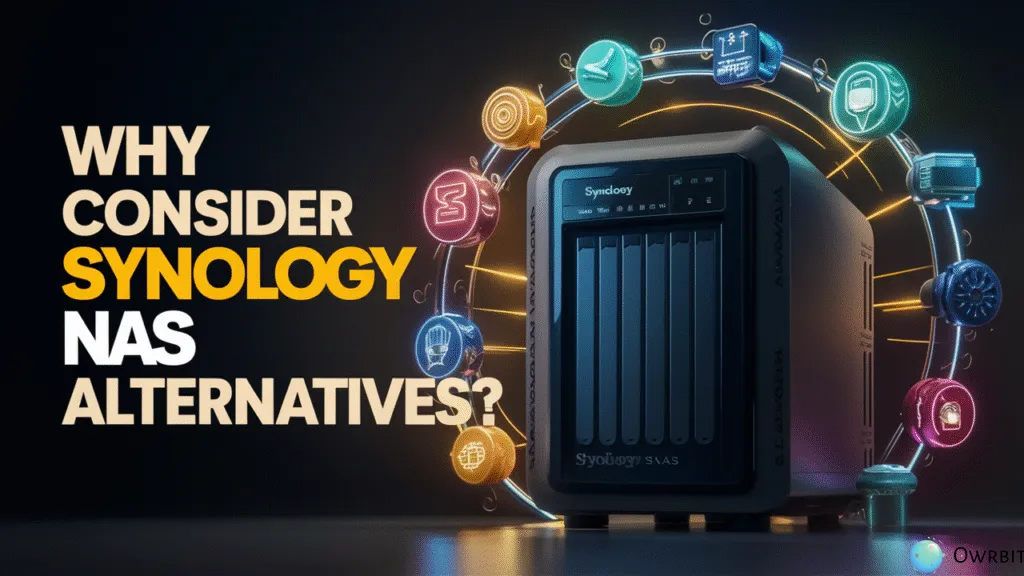
- High Cost
- Synology NAS devices can be expensive, especially when adding drives or upgrading features. Many s offer similar or better specs at a lower price.
- Limited Flexibility
- Some users find Synology’s system too closed or restrictive. A good Synology NAS alternative may provide more customization, open-source support, and control over apps and updates.
- Performance Needs
- For power users handling tasks like video editing, virtualization, or advanced backups, it may be necessary to replace Synology NAS with something more powerful.
- More Features and Tools
- Newer alternatives to Synology NAS often come with better software, user-friendly dashboards, and support for a wider range of third-party tools.
- Scalability
- Some users outgrow their Synology setup. A Synology NAS alternative might offer more drive bays, better CPU/RAM options, and easier expansion.
- Security and Privacy Concerns
- If you want full control over your data security, it may make sense to replace Synology NAS with an option that supports advanced encryption, private cloud features, or offline access.
- Open-Source or DIY Preferences
- Tech-savvy users may want a fully custom setup. A DIY alternative to Synology NAS, like TrueNAS or UnRAID, can give you total control over your NAS build.
- Desire to Try New Tech
- Technology is always evolving. Many are exploring modern Synology NAS alternatives with newer hardware, better energy efficiency, and updated software features.
If any of these points apply to you, it might be time to explore the best options to replace Synology NAS in 2025.
Key Features to Look for in Synology NAS Alternative :
When choosing the best Synology NAS alternative, it’s important to know what features matter most. Here are the key things to look for before you decide to replace Synology NAS:
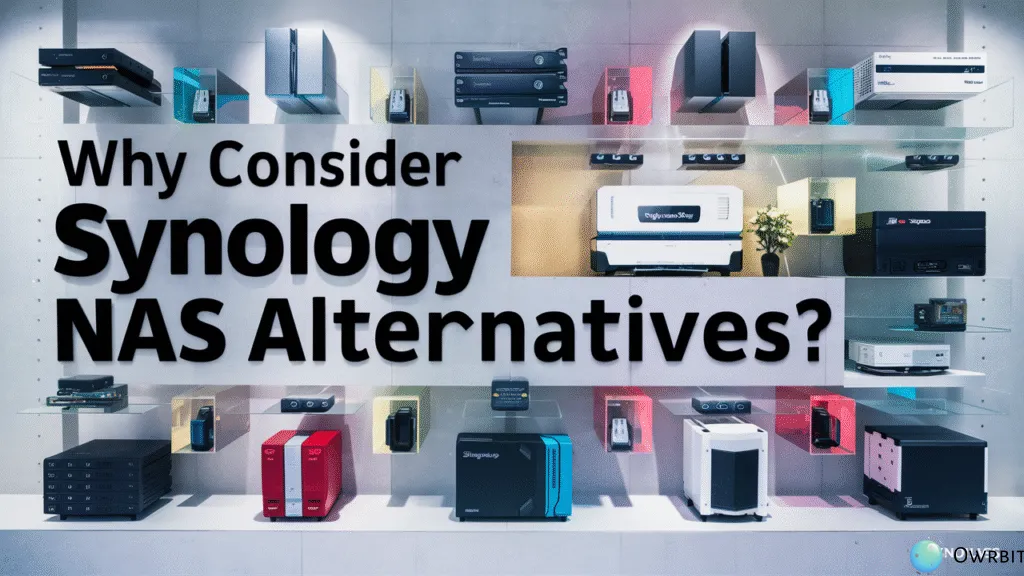
- Storage Capacity & Expandability
- Make sure the Synology NAS alternative can handle your current data and grow with your future needs (more drive bays or expansion units).
- Processor and RAM
- A strong CPU and enough memory help your NAS run fast, especially during backups, file transfers, media streaming, or multitasking.
- RAID Support & Data Protection
- Choose a Synology NAS alternative that supports various RAID levels and offers automatic data protection and recovery options.
- User-Friendly Interface
- Look for a system that’s easy to set up and manage, even if you’re not very tech-savvy. A good interface makes a big difference in daily use.
- App Ecosystem & Compatibility
- A strong Synology NAS alternative should support useful apps for media, backup, file sharing, virtualization, and more.
- Remote Access & Mobile Apps
- The ability to access your files remotely through secure connections or mobile apps is essential in today’s connected world.
- Security Features
- Make sure your Synology NAS alternative includes features like two-factor authentication, encryption, firewall, and user permissions.
- Power Efficiency & Noise Levels
- If you’ll be running it 24/7, choose a NAS that’s energy-efficient and quiet—especially for home or office environments.
- Community & Support
- A large user base and active forums make it easier to get help. Choose an Synology NAS alternative with strong documentation and support.
- Price vs. Value
- Finally, make sure you’re getting good value. A smart decision to replace Synology NAS balances features, reliability, and affordability.
By keeping these points in mind, you’ll be better equipped to find the right Synology NAS alternative that fits your needs in 2025.
Top Synology NAS Alternatives for 2025 :
If you’re ready to replace Synology NAS or just want to explore a reliable Synology NAS alternative, here are the best options to consider in 2025:
Checkout Synology DiskStation vs TerraMaster: Which NAS Should You Choose?
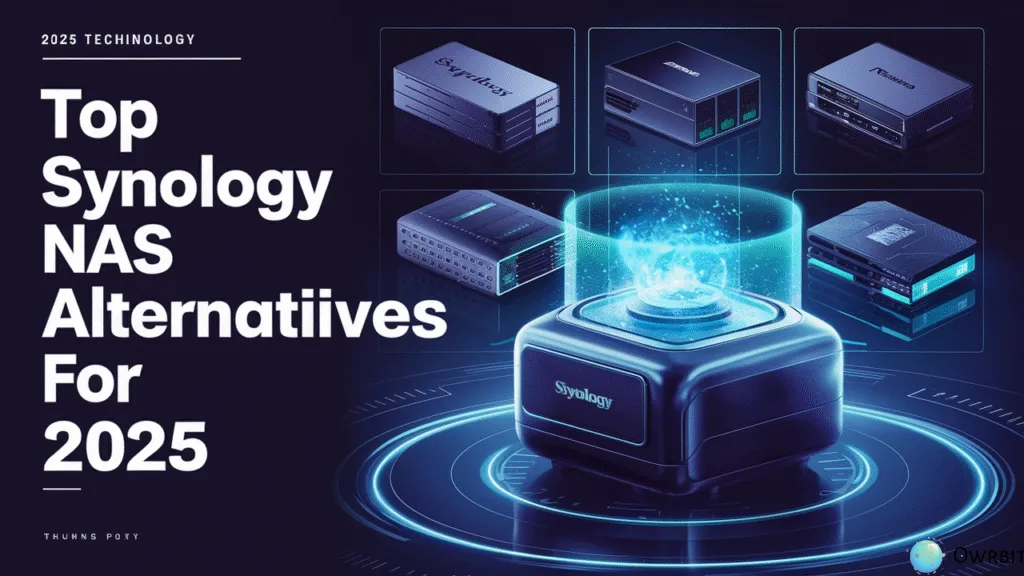
1. QNAP NAS – The Most Powerful Synology NAS Alternative :
QNAP NAS is a leading Synology NAS alternative known for its powerful hardware, flexible software, and wide range of applications. Whether you’re a home user, content creator, or small business owner, QNAP offers scalable and customizable NAS solutions that can easily replace Synology NAS.

Key Features of QNAP NAS :
- Powerful Hardware Options:
- QNAP NAS models come with a variety of processors including Intel Celeron, Core i3/i5/i7, and AMD Ryzen chips. Many units also include 2.5GbE or 10GbE ports, M.2 NVMe SSD slots, and HDMI output.
- QTS Operating System:
- The QTS OS is intuitive, visually appealing, and packed with features. It supports multitasking, app virtualization, and smart monitoring tools.
- App Center with 100+ Apps:
- Includes Plex Media Server, Docker, Surveillance Station, Photo Station, and more—perfect for personal use, content streaming, and business applications.
- RAID and Snapshot Support:
- QNAP supports multiple RAID levels, automatic snapshots, and full system backups, making it a secure Synology NAS alternative.
- Virtualization & Container Station:
- Run Windows, Linux, or other VMs directly on your NAS, or use Docker containers to deploy lightweight applications.
- Remote Access & Mobile Apps:
- Access your NAS securely from anywhere via QNAP’s myQNAPcloud, Qfile, and Qmanager mobile apps.
- Strong Media Capabilities:
- With 4K HDMI output and real-time transcoding, QNAP is great for media centers—making it an ideal choice to replace Synology NAS in home theater setups.
- Enhanced Security:
- Built-in firewall, IP blocking, antivirus, 2FA, and encrypted volumes help protect your data 24/7.
QNAP NAS stands out as a feature-rich, high-performance Synology NAS alternative that’s great for users who want more than just basic storage.
Why QNAP is a Great Synology NAS Alternative?
QNAP is one of the top choices if you’re looking to replace Synology NAS in 2025. It offers a perfect balance of performance, flexibility, and advanced features, making it a strong Synology NAS alternative for many users.
- More Hardware Options
- QNAP offers a wider range of models than Synology, from basic 2-bay setups to enterprise-grade NAS with high-end CPUs, GPU slots, and 10GbE networking. This makes it easier to find a Synology NAS alternative that fits your exact needs.
- Advanced Virtualization Support
- With support for running virtual machines, containers (Docker & LXC), and apps like Virtualization Station, QNAP is ideal for power users or businesses who need more than basic storage.
- Strong App Ecosystem
- The QNAP App Center includes over 100+ applications, including backup tools, media servers, productivity apps, and security add-ons—making it a full-featured Synology NAS alternative.
- Excellent Media Streaming
- Many QNAP NAS models come with HDMI ports and support 4K video playback and real-time transcoding, making it a top pick to replace Synology NAS as a home media center.
- Robust Security Features
- From AES 256-bit encryption to real-time snapshots and antivirus tools, QNAP helps protect your data effectively. This makes it a secure Synology NAS alternative for sensitive personal or business use.
- Customizability and Flexibility
- QNAP gives you more control over how your NAS operates. Advanced users can tweak settings, install third-party tools, or run their own scripts—something that’s limited in Synology’s more closed system.
- Frequent Updates and Active Community
- QNAP regularly updates its firmware and apps. It also has a strong online community and support resources, making it easier to troubleshoot or learn as you replace Synology NAS.
If you’re looking for a powerful, customizable, and feature-rich Synology NAS alternative, QNAP is one of the best options available in 2025.
2. TerraMaster NAS – Budget-Friendly Synology NAS Alternative :
TerraMaster NAS is a reliable and budget-friendly storage solution designed for personal, small business, and home office use. Offering robust performance at an affordable price point, TerraMaster is an excellent Synology NAS alternative for users who need dependable file storage, data backup, and media streaming without the high cost. It uses TOS (TerraMaster Operating System), which allows for an easy setup and simple management interface.

Key Features of TerraMaster NAS :
- Affordable Storage Solution:
- TerraMaster NAS is known for its competitive pricing, making it a go-to option for those looking to replace Synology NAS without breaking the bank. It offers both 2-bay and 4-bay models, allowing users to customize storage capacity based on their needs.
- TOS (TerraMaster Operating System):
- TerraMaster’s operating system is straightforward and user-friendly. It allows easy file management, backup solutions, and remote access features. While it’s not as feature-rich as Synology’s DSM, TOS is intuitive and effective for most home or small business needs.
- RAID Support:
- TerraMaster NAS supports multiple RAID configurations, such as RAID 0, RAID 1, RAID 5, and RAID 10. This offers flexibility in balancing speed and data redundancy, protecting your data in case of hardware failure.
- Multimedia and File Sharing:
- It comes with built-in support for media servers like Plex and provides smooth streaming of music, videos, and other media files across devices. It also supports file-sharing protocols like SMB, AFP, NFS, and FTP, making it easy to connect with various devices in your network.
- Cloud Backup and Sync:
- TerraMaster allows for integrated cloud storage and backup options, including popular services like Google Drive, Dropbox, and OneDrive. This feature ensures that your data is safe both locally and in the cloud, adding an extra layer of protection.
- Expandable Storage:
- TerraMaster models come with a variety of expansion options, including the ability to add additional drives as your storage needs grow. This scalability ensures that the system can keep up with increasing data requirements over time.
- Remote Access:
- With TerraMaster’s Cloud Storage and remote access capabilities, users can access their files from anywhere, giving flexibility and convenience for users who need to work remotely or on-the-go.
- Energy Efficiency:
- TerraMaster NAS devices are designed to be power-efficient, ensuring that you don’t have high electricity bills while using the system 24/7 for backups or file access.
TerraMaster NAS is an excellent alternative to Synology NAS for users who prioritize affordability and ease of use. With features like RAID support, cloud backup, and multimedia streaming, it offers great value, especially for home or small office environments. It may lack some of the advanced functionalities of high-end solutions like Synology, but it’s a solid choice for users who need reliable and budget-conscious storage.
3. Asustor NAS – Versatile Synology NAS Alternative for Mixed Use
Asustor NAS is a well-rounded and feature-rich Synology NAS alternative, ideal for both home users and small to medium-sized businesses. Known for its strong performance and flexibility, Asustor offers an intuitive interface, powerful apps, and robust storage capabilities, making it a strong contender for users looking to replace Synology NAS with something more customizable and cost-effective.

Key Features of Asustor NAS :
- ADM (Asustor Data Master) Operating System:
- Asustor NAS runs on its custom operating system, ADM, which is user-friendly and efficient. It offers a smooth and intuitive interface, making it easy for both beginners and advanced users to manage their storage, applications, and settings. ADM’s design is clean and allows for easy installation of additional apps from the Asustor App Central.
- Wide App Ecosystem:
- Asustor NAS supports a rich ecosystem of apps available through App Central. Whether you need tools for file management, multimedia streaming, surveillance, or business use, there’s a wide range of apps to choose from. It even includes apps like Plex for media streaming, making it a great choice for users who want to set up a home media server.
- RAID and Data Protection:
- Asustor NAS supports multiple RAID configurations (RAID 0, RAID 1, RAID 5, RAID 6, RAID 10) and offers built-in data protection tools like snapshots and backup solutions. This ensures your data is safe from hardware failures, accidental deletions, or corruption.
- Powerful Hardware Options:
- Asustor devices are equipped with solid hardware, including Intel and ARM processors, providing good performance for tasks like file sharing, video streaming, and running virtual machines. With models that come with up to 8GB of RAM and powerful multi-core CPUs, Asustor is a strong Synology NAS alternative for users needing more computing power.
- Multimedia Features:
- Asustor NAS is ideal for users looking to stream multimedia content. It supports popular media server applications like Plex and supports HDMI output for connecting directly to a TV or monitor, allowing users to play movies or display media directly from the NAS.
- Remote Access & Mobile Apps:
- Asustor’s AiMaster mobile app and AiData apps allow users to manage and access their data remotely. The mobile apps make it easy to access files, monitor system status, and share data directly from your smartphone or tablet.
- Virtualization & Business Support:
- Asustor NAS supports virtualization technologies like Docker, VirtualBox, and VMware, making it a great choice for users who want to run virtual machines or use containerized applications. This is especially useful for small businesses or tech enthusiasts who need more flexibility.
- Cloud Integration & Backup:
- It offers seamless integration with cloud storage services like Google Drive, Dropbox, and OneDrive. Asustor allows for both cloud syncing and automatic cloud backups, ensuring your data is backed up safely offsite.
- Security Features:
- Asustor NAS is equipped with multiple layers of security, including AES 256-bit encryption, two-factor authentication, and advanced user permissions. These features help protect sensitive data and prevent unauthorized access.
Asustor NAS is a great Synology NAS alternative for users who need powerful hardware, an extensive app ecosystem, and a user-friendly interface. Whether you’re setting up a home media server or managing data for a small business, Asustor provides a versatile solution that offers good value for its price.
4. Netgear ReadyNAS – Reliable Business-Grade Synology NAS Alternative
Netgear ReadyNAS is a high-performance, business-grade storage solution that offers powerful data protection, reliable performance, and flexibility. It is a great Synology NAS alternative for small businesses, remote offices, or advanced home users who need robust features like real-time anti-virus, cloud backup, and high security. ReadyNAS focuses on delivering enterprise-grade features with an easy-to-use interface, making it a solid choice for users looking to replace Synology NAS in more professional environments.

Key Features of Netgear ReadyNAS :
- Real-Time Data Protection:
- Netgear ReadyNAS features real-time anti-virus scanning and snapshot protection to safeguard your data. It offers continuous protection against ransomware and viruses, helping to ensure that your files remain secure.
- RAID Support and Data Redundancy:
- ReadyNAS supports a wide range of RAID configurations (RAID 0, RAID 1, RAID 5, RAID 6, and RAID 10), allowing you to set up the system for data redundancy or speed, depending on your needs. Its XRAID technology also offers automatic RAID management and expansion, which is great for users looking to scale up without complex manual configurations.
- High-Performance Hardware:
- Powered by Intel processors and featuring large memory capacities (up to 8GB in some models), ReadyNAS offers excellent performance, even with demanding applications like virtualization, large file transfers, and multimedia streaming.
- Cloud Integration and Backup:
- Netgear ReadyNAS seamlessly integrates with cloud services such as Google Drive, Dropbox, and Amazon S3 for offsite backup and data synchronization. Its ReadyCLOUD feature allows for easy remote access and backup, ensuring your data is protected both on-site and in the cloud.
- Advanced Security Features:
- Netgear ReadyNAS provides AES-256 encryption, two-factor authentication, and secure FTP to ensure your data remains safe from unauthorized access. It also supports Active Directory (AD) and LDAP for easier user and device management in business environments.
- Virtualization Support:
- ReadyNAS supports VMware, Hyper-V, and iSCSI for users who need to integrate their NAS with virtualized environments. This makes it ideal for businesses looking to consolidate their storage infrastructure.
- Mobile Access:
- The ReadyNAS mobile app allows you to access your files on the go, ensuring that your data is always accessible, no matter where you are. You can easily upload, download, and share files remotely.
- Energy Efficiency:
- Netgear ReadyNAS models are designed to be energy-efficient, helping businesses and home users reduce power consumption, even when running 24/7.
- Easy Setup and Management:
- ReadyNAS provides a simple web-based interface that allows for easy setup and management of storage, security, and backup tasks. The intuitive interface ensures that even those with limited technical expertise can manage the system efficiently.
Netgear ReadyNAS is a powerful alternative to Synology NAS, especially suited for small businesses or advanced home users who need high security, data protection, and scalability. Its robust features, including cloud integration, virtualization support, and advanced RAID management, make it a great choice for professional-grade storage systems. However, its higher price point and more enterprise-focused features may not make it the best fit for casual home users.
Comparative Analysis of Synology NAS Alternatives :
Here’s a comparative analysis of the top Synology NAS alternatives in a table format:
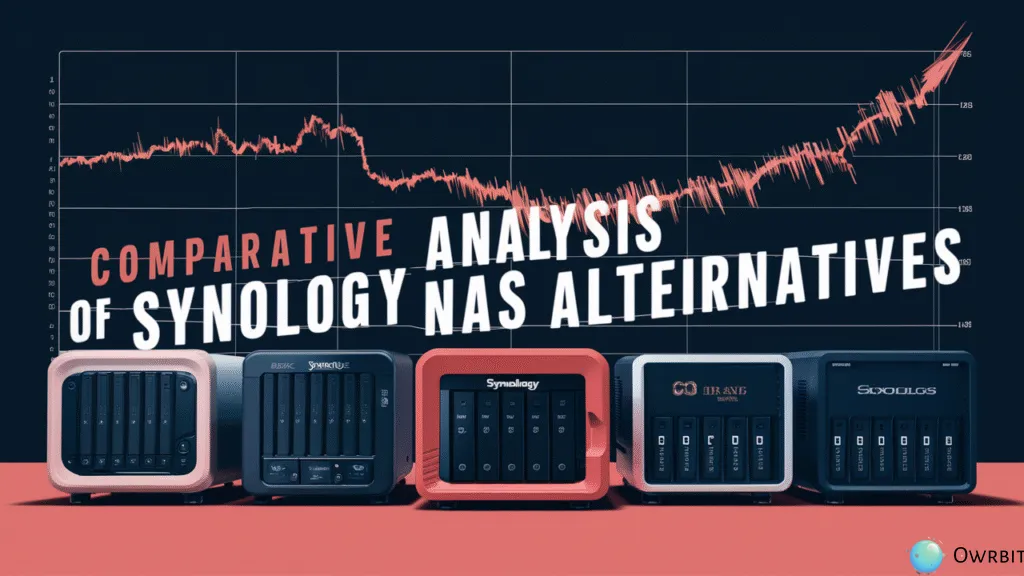
| Feature | TerraMaster NAS | Asustor NAS | Netgear ReadyNAS | QNAP NAS |
|---|---|---|---|---|
| Price | Budget-friendly | Mid-range | High-end, business-focused | Mid to high-end |
| Operating System | TerraMaster OS (TOS) | Asustor Data Master (ADM) | ReadyNAS OS | QTS (QNAP Turbo System) |
| RAID Support | RAID 0, 1, 5, 10 | RAID 0, 1, 5, 6, 10 | RAID 0, 1, 5, 6, 10, XRAID | RAID 0, 1, 5, 6, 10 |
| Cloud Backup Integration | Yes (Google Drive, Dropbox) | Yes (Google Drive, Dropbox) | Yes (Google Drive, Dropbox, Amazon S3) | Yes (Google Drive, Dropbox, OneDrive) |
| Virtualization Support | No | Yes (Docker, VMware, VirtualBox) | Yes (VMware, Hyper-V, iSCSI) | Yes (VMware, Hyper-V, Virtualization Station) |
| Multimedia Support | Basic (Plex support) | Yes (Plex, HDMI output) | Yes (Plex, multimedia streaming) | Yes (Plex, multimedia tools, HDMI output) |
| Security Features | Basic (Encryption, basic user control) | Advanced (AES-256 encryption, 2FA) | Advanced (AES-256 encryption, 2FA, Real-time antivirus) | Advanced (AES-256 encryption, 2FA, Antivirus, VPN) |
| Hardware Performance | Entry-level | Mid to high-end (Intel/ARM processors) | High-end (Intel processors) | High-end (Intel/AMD processors, high RAM options) |
| Ease of Setup | Very easy (user-friendly interface) | Easy (intuitive ADM interface) | Easy (simple web-based interface) | Easy (user-friendly QTS interface) |
| App Ecosystem | Limited | Extensive (App Central) | Smaller than QNAP’s | Extensive (App Center, wide range of apps) |
| Mobile Access | Yes (Mobile app) | Yes (AiMaster & AiData) | Yes (ReadyNAS mobile app) | Yes (Qfile, Qmanager, QNotes) |
| Scalability | Good (expandable bays) | Excellent (expandable, multiple RAID options) | Excellent (expandable with XRAID) | Excellent (expandable, flexible RAID options) |
| Ideal For | Home users, small businesses | Home users, SMBs | Small businesses, advanced home users | Home users, SMBs, enterprises |
This comparison should help you determine which QNAP NAS alternative suits your needs, based on price, performance, and features.
How to Transition from Synology to an Synology NAS Alternative?
Transitioning from Synology NAS to an Synology NAS Alternative can seem like a daunting task, but with the right approach, it can be a smooth process. Whether you’re switching to QNAP, Netgear ReadyNAS, Asustor, or TerraMaster, the general steps are similar. Below is a step-by-step guide to help you transition efficiently:
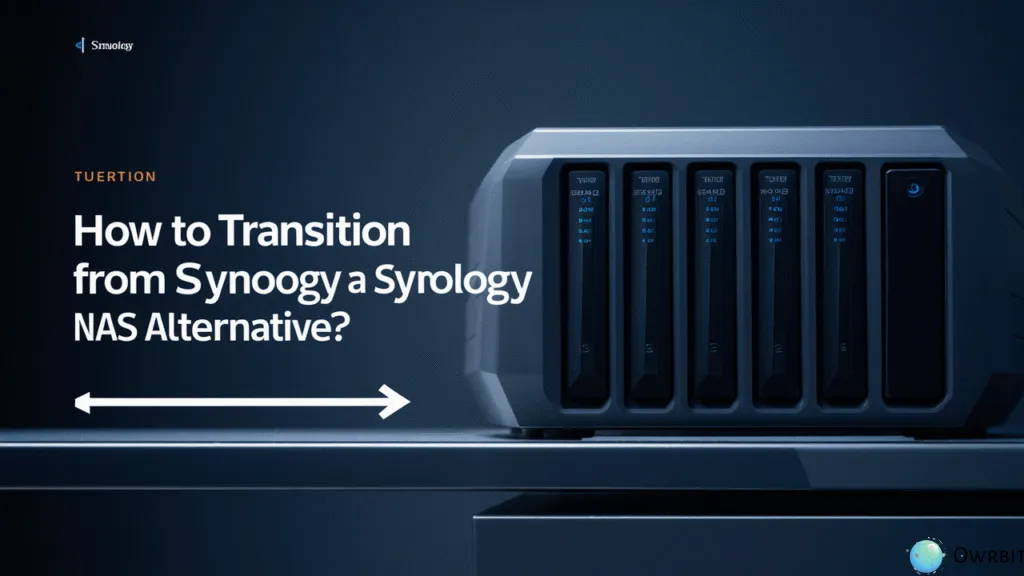
- 1. Evaluate Your Needs and Choose the Right NAS Alternative:
- Assess your hardware, software, scalability, and security needs.
- Consider options like QNAP, Netgear ReadyNAS, Asustor, or TerraMaster based on your requirements.
- 2. Backup Your Data from Synology NAS:
- Cloud Backup: Use Hyper Backup to sync data to cloud services (Google Drive, Dropbox, etc.).
- Local Backup: Back up data to an external hard drive.
- Network Backup: Use tools like rsync for a network backup.
- 3. Set Up Your New NAS Alternative:
- Unbox and Assemble: If necessary, install hard drives and follow manufacturer instructions.
- Install the OS: Ensure the new NAS has its operating system installed (e.g., QTS for QNAP).
- Configure RAID: Set up the RAID configuration (RAID 0, 1, 5, etc.).
- Create User Accounts: Set up user accounts with appropriate permissions for access control.
- 4. Migrate Your Data:
- Direct Transfer: Transfer data directly between Synology NAS and the new NAS over the network using SMB, FTP, or rsync.
- Cloud Sync: Use cloud services (Google Drive, Dropbox) to sync data between the two NAS devices.
- External Drive Migration: If you have a backup on an external drive, plug it into the new NAS and transfer the files.
- 5. Configure Backup and Security Features:
- Set Up Backups: Schedule regular backups to external drives or cloud services.
- Enable Encryption: Use AES-256 encryption for secure data storage.
- Two-Factor Authentication (2FA): Set up 2FA for extra security.
- 6. Install Apps and Configure Services:
- Multimedia Apps: Install apps like Plex or Emby if you use your NAS for media streaming.
- Cloud Sync: Set up cloud services (Google Drive, Dropbox) for syncing backups or files.
- Virtualization: If needed, install VMware or VirtualBox for virtualization support.
- 7. Test Your New NAS:
- Access Files: Verify that files are accessible from various devices (PC, mobile, etc.).
- Test Backup: Test the backup by restoring deleted files to ensure the process works.
- Network Speed: Check the network speed to confirm the NAS is performing optimally.
- 8. Decommission Your Synology NAS:
- Factory Reset: Perform a factory reset if you plan to sell or repurpose the Synology device.
- Reassign or Repurpose: If keeping the Synology NAS, reconfigure it for another purpose (e.g., backup storage).
Conclusion :
Switching to a Synology NAS alternative can be a great decision depending on your specific needs. Whether you’re looking for better performance, different features, or a more budget-friendly option, there are many options available to replace Synology NAS. Choosing the right alternative to Synology NAS can help improve your storage management, data security, and overall user experience.
By considering key factors like hardware specs, software ecosystems, and scalability, you can easily find a Synology NAS alternative that suits your needs. Whether it’s QNAP, Asustor, Netgear ReadyNAS, or TerraMaster, there’s an option that can meet your expectations for both home and business use.
To ensure a smooth transition when you replace Synology NAS, make sure to back up your data properly, set up the new system carefully, and configure it with all the security features you need. Testing the new Synology NAS alternative will also ensure that everything is working well before you fully make the switch.
Remember, the key is to find a Synology NAS alternative that fits your current and future needs. By following the right steps and understanding what you want from your storage system, you’ll have no trouble finding the perfect Synology NAS alternative and seamlessly migrating your data.
Making the move to replace Synology NAS can help you optimize your storage and even unlock new features that weren’t available with your old system. Whether you’re motivated by cost, performance, or functionality, the right Synology NAS alternative is out there waiting for you.
Checkout Synology DiskStation vs TerraMaster: Which NAS Should You Choose?
Discover more from Owrbit
Subscribe to get the latest posts sent to your email.

